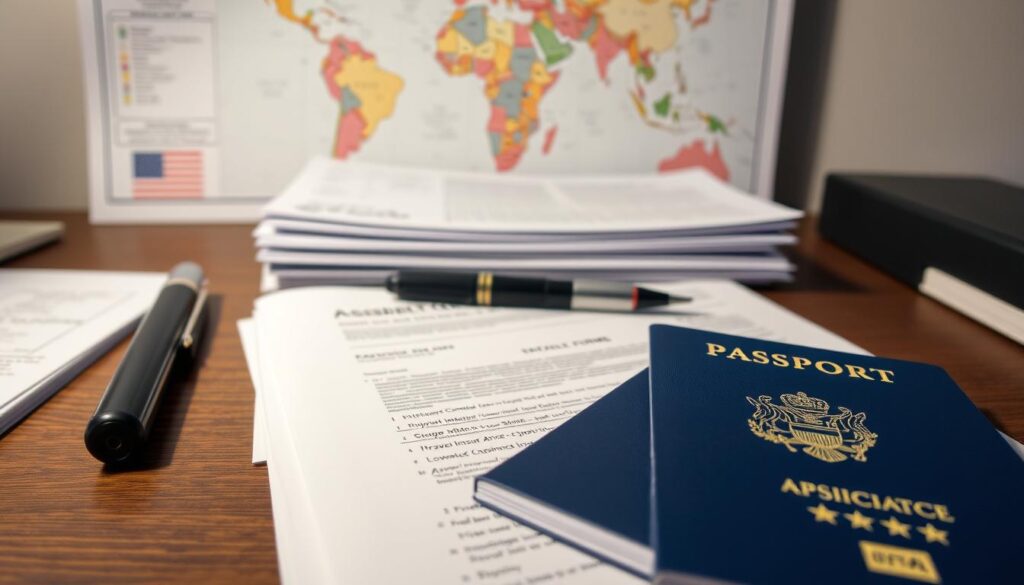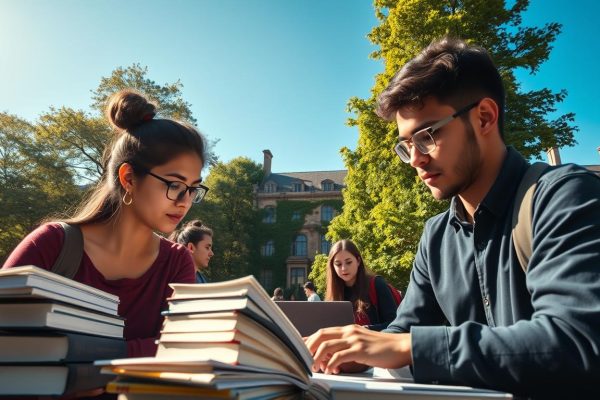Are you dreaming to study in Abroad in 2025? Let’s Jump in to know – Everything You need to know Before Studying Abroad in 2025. Embarking on a study abroad journey is a significant milestone in a student’s academic life. It’s an experience that can shape your future, offering a unique blend of academic and cultural enrichment.
Once you’ve found the perfect program that aligns with your goals, it’s time to prepare for your adventure. While thinking about your packing list, travel insurance, and finances may not be as exciting as the memories you’ll make, it’s crucial for a smooth transition.
Students need to understand the essential requirements and preparations before embarking on their international educational journey. Proper planning significantly impacts the quality of the abroad experience.
Key Takeaways
- Understand the essential requirements for studying abroad.
- Plan finances and accommodation in advance.
- Research cultural differences and adapt accordingly.
- Ensure you have the necessary documentation and insurance.
- Prepare for the practical logistics of studying in another country.
Essential Documents and Paperwork
When preparing for study abroad, it’s crucial to focus on the essential documents required for a smooth transition. Ensuring you have the necessary paperwork in order is vital for a successful experience.
Passport and Visa Requirements
Your passport is your most critical travel document. Check its expiry date to ensure it doesn’t expire within six months of your planned departure date, as many countries require this for entry. Depending on your nationality and destination, you may need to apply for a student visa. Your study abroad program or advisor can guide you through this process, but it’s essential to understand the specific requirements and timelines for your visa application.
Academic Transcripts and Acceptance Letters
Gathering academic documents such as transcripts, diplomas, and acceptance letters is another crucial step. Some countries or institutions may require these documents to be officially translated or notarized. Ensure you have both digital and physical copies of these documents, as well as your acceptance letter from the host institution.
Creating Digital and Physical Copies
It’s a good practice to create both digital and physical copies of your important documents. This includes your passport, visa, academic transcripts, and insurance documents. Store digital copies securely, using encrypted cloud storage, and keep physical copies in a safe, accessible location. This backup plan ensures you can access your documents in case of loss or theft.
| Document | Purpose | Action Required |
|---|---|---|
| Passport | Travel and identification | Check expiry date, renew if necessary |
| Student Visa | Legal stay and study in host country | Apply according to host country’s requirements |
| Academic Transcripts | Proof of academic background | Gather, translate, or notarize if required |
| Acceptance Letter | Proof of admission to host institution | Obtain from host institution, keep digital and physical copies |

Know Before Studying Abroad about Finances

To ensure a smooth transition into your study abroad program, financial preparation is key. Managing your finances effectively is crucial for a successful experience.
Setting a Realistic Budget
Creating a comprehensive budget that accounts for tuition, housing, meals, transportation, health insurance, visa fees, and personal expenses is essential before departure. Understanding the cost of living in your host country helps establish realistic financial expectations and prevents unexpected shortfalls.
International Banking and Currency Exchange
Researching international banking options, including travel-friendly debit cards, credit cards with no foreign transaction fees, and mobile banking apps that work globally, is vital. Notifying your home bank about your travel plans prevents your accounts from being frozen due to suspected fraudulent activity.
Scholarships and Financial Aid Options
Exploring scholarship opportunities specifically designed for study abroad students, including program-specific scholarships, government funding, and private foundation grants, can significantly offset expenses. Understanding how your existing financial aid package may or may not transfer to your study abroad program requires consultation with your home institution’s financial aid office.
Securing Accommodation Abroad

Securing housing abroad is a top priority that requires careful consideration and planning. You’ll need to decide on your budget, preferred living arrangements, and location. While online research is helpful, it’s challenging to find the perfect place from afar.
It’s advisable to consult your study abroad advisor and alumni for valuable insights and resources. They can provide tips on where to live and help you navigate the process. Whether you choose to live alone, with fellow students, or with a host family, securing your housing in advance is crucial.
University Housing vs. Private Rentals
University housing offers convenience and a built-in community, making it easier to settle in. On the other hand, private rentals provide more independence and potentially more space, but may require understanding local rental agreements.
Homestay Options and Benefits
Living with a host family can enhance your cultural immersion and language skills. However, it requires adaptability to family routines and rules.
Factors to Consider When Choosing Housing
Consider factors like proximity to your school, neighborhood safety, access to public transportation, and amenities when choosing your housing in the host country for your abroad program.
Health Preparations and Insurance

As you prepare for your study abroad journey, it’s essential to prioritize your health and well-being. This involves taking care of your physical and mental health, as well as securing the right insurance coverage.
Required Vaccinations and Medical Check-ups
Scheduling a comprehensive medical check-up several months before departure allows time to address any health concerns and complete required vaccinations. Researching country-specific vaccination requirements and recommendations through resources like the CDC’s Travelers’ Health website helps prevent health issues abroad.
Prescription Medications Abroad
Managing prescription medications requires advance planning, including obtaining sufficient supplies for your entire stay and carrying documentation proving their medical necessity. Understanding how prescription medications are regulated in your host country is crucial, as some common US medications may be illegal or require special authorization abroad.
Selecting the Right Insurance Coverage
Selecting appropriate health insurance coverage specifically designed for international students ensures access to quality healthcare without financial hardship. Comprehensive insurance should cover emergency medical evacuation, repatriation, mental health services, and routine care in addition to emergency treatment.
It’s also important to have a reliable health and accident insurance policy while studying abroad, as well as coverage for emergency evacuation and repatriation. Comprehensive travel insurance will cover flight delays, cancellations, lost luggage, stolen personal belongings, and evacuation in the case of a health emergency or natural disaster.
Effective Preparation for Study Abroad: Language and Culture
Effective preparation for study abroad involves more than just academic readiness; it requires a grasp of the local language and cultural nuances. To ensure a smooth transition into your new environment, it’s crucial to develop your language skills and cultural awareness before departure.

Basic Language Skills to Learn Before Departure
Learning basic conversational phrases in the local language demonstrates respect and facilitates daily interactions, even if you’ll be studying in an English-language program. Utilize language learning apps like Duolingo or Ling to build foundational language skills before departure.
- Learn basic phrases such as greetings, directions, and expressions of gratitude.
- Use online resources like podcasts and language courses to improve your language skills.
Understanding Local Customs and Etiquette
Researching cultural norms regarding personal space, greetings, dining etiquette, and appropriate dress prevents unintentional offense and eases cultural transition. Understanding local customs around tipping, gift-giving, and social interactions helps navigate potentially confusing situations with confidence.
- Familiarize yourself with local laws and regulations that might differ significantly from your home country.
- Explore resources like country-specific guidebooks and cultural orientation materials from your program.
Resources for Cultural Immersion Preparation
To prepare for cultural immersion, utilize resources such as country-specific guidebooks, cultural orientation materials, and international student groups. These resources provide valuable insights into the local culture and help you develop cultural humility and an open mindset.
- Connect with alumni or current students from your program to gain firsthand insights into cultural nuances.
- Develop coping strategies before encountering culture shock by identifying potential cultural adjustment challenges specific to your destination.
Travel Planning and Transportation

As you count down to your study abroad program, it’s essential to focus on travel planning and transportation. Finding affordable flights is a top priority. With the rise of student travel agencies like StudentUniverse, you can now book cheap flights with flexible dates, which is ideal for students who may need to change their return plans.
Finding Affordable Flights
To get the best deals, consider booking your flight 2-3 months in advance. Use student discount platforms and fare comparison tools to maximize your savings. Be sure to check the flexibility of your ticket, as some airlines offer more flexible options than others.
Local Transportation in Your Host Country
Researching local transportation systems in your host country is crucial for daily commuting. Look into public transit options, rideshare availability, and bicycle rental programs. Understanding transportation etiquette and payment systems will also help you navigate your new environment.
Planning for Weekend Trips and Exploration
With your travel plans in place, you can start thinking about weekend trips and exploring your destination. Research nearby destinations, transportation options, and student discounts to make the most of your time abroad. Consider the visa requirements for neighboring countries to avoid any issues during your trips.
Packing Strategies for Long-Term Study Abroad
Packing for a long-term study abroad program requires careful consideration and planning. It’s essential to strike a balance between bringing what’s necessary and avoiding excessive luggage.
Essential Items to Bring
When deciding what to pack, consider the climate and cultural norms of your host country. Stock up on essential toiletries and medication to ensure you have what you need until you can find local alternatives. Clothing should be versatile and layered for different weather conditions.
What to Buy After Arrival
Not everything needs to be packed before you leave. Plan to purchase bulky items like toiletries, bedding, and household supplies after arrival to save luggage space and weight. This also gives you the opportunity to explore local shopping options.
Electronics and Adapters for International Use
Don’t forget to pack electronics and adapters that are compatible with your host country’s power outlets and voltage requirements. This includes power banks, country-specific adapters, and converters for your devices.
By adopting a minimalist packing approach and prioritizing essentials, you can ensure a smooth transition into your study abroad life.
Staying Connected with Family and Friends
Being apart from family and friends can be tough, but there are many ways to stay in touch while studying abroad. With the rise of technology, it’s easier than ever to maintain relationships despite the distance.

Communication Apps and Services
Communication apps such as Zoom, Skype, Whatsapp, and Messenger are easy ways to keep in contact with people from home without having to spend money on international calls. You can also create a travel-specific account or start a family group chat to frequently check in on your friends and family members.
Setting Expectations for Contact
It’s essential to set realistic expectations with your family and friends about communication frequency, considering time zone differences, busy academic schedules, and limited internet access in some locations. Establishing a routine that balances staying connected with home while remaining present in your study abroad experience is key.
Some ways to achieve this balance include using email or messaging apps, creating alternative communication methods such as blogs or photo-sharing platforms, and discussing emergency communication protocols with your family.
Setting Goals for Your Study Abroad Experience
Your study abroad experience can be a life-changing event, and setting the right goals is key to unlocking its full potential. To make the most of your time abroad, it’s helpful to have a diverse set of objectives, ranging from short-term tasks to long-term aspirations.
Creating a balanced set of goals that encompass academic achievement, cultural immersion, personal growth, and exploration provides direction for your study abroad experience. By developing SMART goals (Specific, Measurable, Achievable, Relevant, Time-bound), you can increase the likelihood of achieving meaningful accomplishments during your time abroad.
To maximize the impact of your study abroad experience, consider how it fits into your broader academic and career objectives. Documenting your goals before departure and revisiting them periodically allows for reflection and adjustment as your perspectives evolve. This approach will help you make the most of your time abroad and create a lasting impact on your life.











